- Home
- Tennessee Williams
Moise and the World of Reason Page 3
Moise and the World of Reason Read online
Page 3
“Since matters in such a state cannot be thought of as standing nor as standable, either. However”
“Sssssssssss!”
“However, in all circumstances, before accepting surrender, one last resistance seems required by the nature of all still existent.”
How long it might have continued is a matter for speculation had not the little clutch of attendant bitches behind Skates, probably feeling that she had scored her point, begun to draw her back along the corridor to the street, some striking matches as they moved her, and it made me think of how the Queen Ant is moved by the colony and that is an incorrect statement for at that moment it made me think of nothing: it makes me think now, in retrospect, of a malignantly fertile insect, yes, perhaps a sort of huge driver ant being hauled about by drones in the colony of malignant creatures, a thing I once saw magnified by a microscopic lens in a copy of the National Geographic.
Last month received a rejection slip from a little mag called It Is and the Editress had scrawled on the slip, “Incoherency is but is not.” Oh, well.
Of coherency, I usually attempt it.
I was now alone with Moise, I mean I was then alone with Moise. We were not visible to each other but our hands were in contact.
“Was that Skates at the party? Did she hear the announcement? Was someone blowing a whistle? The light was so dim that—”
“Love, don’t you remember?”
“Did they all?”
‘What?”
“Go before the request?”
“No, no, if you mean Tony.”
“I meant Jane too.”
“Of course, and I think the actress”
“But she lost consciousness, she, she did, she fell down, I think she meant well but she fell!”
“Moise, dear, things will be repeated, it was that sort of occasion when things will be repeated via the grapevine. Time, it may take time, and Life and Fortune and People, but things will be reported about the party and eventually”
“Yes, I know, I know. And so the party is over.”
I think that I was beginning to catch Charlie’s fever since I broke into song.
“The party’s over, the candle flickered and dimmed.”
Not very funny, but then
“Go, dear. I have to pray. I do it better alone.”
And so she dismissed me, gently.
All the way back to the rectangle with hooks I sang that song which now makes me cry. Do you remember? Killing me softly with his song . . .
I am sure that by this point you have come to realize that present conditions are distinctly unfavorable to putting things in order.
Without expansion of that remark, let me include a slight account of a close call to an encounter between Moise and Skates at an occasion a month or so previous to the announcement party.
It was the exhibition of Don Bachardy’s portraits at the museum near what was once called Columbus Circle and maybe still is.
I went with Moise.
We had been there admiring the portraits for less than five minutes when a great commotion occurred near an elevator door which had just opened. I recognized the cause and I turned Moise away from it.
Yes, it was Skates, attended.
She was scarcely out of the elevator, possibly still in it, when that phenomenally shrill voice cried out, “My God, an exhibition of realistic portraits just when my non-portraits are catching on!”
Variations upon this outcry were echoed by her attendants. The effect was rather chilling on the large room although it was crowded to capacity and the body heat was sufficient to have made it comfortable without radi
Sorry. Do radiators exist in the world anymore?
The next thing I knew was that in this chillness a great man of letters—was it Isherwood? Christopher, yes, of course—had gone straight up to Skates as if unaware of danger and had said in a loud, very clear English voice, “Did I hear you say non-portraits?”
“Sssssss!”
(Echoed by attendants.)
“What are non-portraits, if you’ll explain the term, are they portraits which are not portraits, and if that is so, what are they?”
“Sssss!”
(Echoed by attendants.)
And on that occasion, too, the attendants removed her from the scene as a massive female insect, dedicated to the reproduction of the species, venomous, is removed by its drones.
I would say it took ten minutes to remove the vapor about the elevator by which Skates had arrived and departed with her attendants.
Moise seemed to be unaware of what had occurred.
It was only on the subway going downtown that she remarked after a long reflective silence between us,
“I suppose.”
“What?”
“Skates.”
“Yes?”
“Is inclined to”
“What?”
“Realistic self-portraits of a certain nature.”
“I know, but being deluded”
“Oh, deluded, no. I think she is quite at home in the world of reason.”
I am sure that you must see, now, why I thought it appropriate to squeeze this account of the previous encounter, such as it was or wasn’t, into my last Blue Jay notebook.
It’s seldom my practice to observe sequence. When I try to, my thoughts blur and my fingers shake but these being the final three pages of my last Blue Jay, I have a sense of time running out on me faster than running in, and it is surely advisable, then, to include at once the reason for the rage of Skates at Moise. I shall tell it badly but I shall tell it as best I can.
About two years ago, the artist-teacher Tony Smith referred favorably in a lecture at Hunter College to the work and character of Moise. The reference was to the effect that the purest painter now painting was a child of God called Moise and that she was enduring an existence impossible to sustain because her primary excellence in her vocation, the purity and austerity of it, made it psychologically impossible for her to exhibit during her lifetime. This reference to Moise and her work was noted by a friendly acquaintance of hers on the staff of The Village Voice and it was printed, the reference by Smith, in that gazette. Moise did not refer to this reference, never, but it was the first bit of real encouragement which she had received and it had, I infer from her announcement last night, made of Tony Smith of Hunter College and South Orange, New Jersey, and the world of Western Art, a God to Moise.
I feel a bit of confusion coming on me and if I were on a plane there would surely be an announcement: “Please fasten seat belts, we are about to enter a bit of turbulence.”
(I’ve never been on a plane but “the living nigger on ice” was often on them and he told me of these announcements which always amused him so that he would howl with laughter at them, he told me.)
Now I have got to discontinue this thing for a while, even though I never ignore the possibility that some inadvertence, a sudden subway of sorts, may stop it permanently in its tracks as Mr. Eighty-seven at Bellevue.
Rest, breathe, recover if you can, the cry is still En avant.
I suppose it is simply and inescapably human to attribute all defections on the part of your loved one to some influence other than what is the commonest fact, an insufficiency in you to his requirements of a lover. Such an admission is quite inadmissable at first, so you attribute it to some external thing such as fever and the unsettling announcement party at Moise’s. This gives you an excuse to make all dignified and many undignified efforts to recover him from the seductor. “Seductor” is not a true word, I’m afraid, but never mind, let it pass. I’m sure you know what it means. Later on you will be obliged to accept that commonest truth of the matter, assuming there’s truth in matter, that he has simply latched on to a new and more magnetic attraction than you have presented to him, and that later-on moment is probably the moment when you stop being young, even though it may not whiten your hair at the temples prematurely or score its impact with deeper lines in your face.
After prowling the premises in this houndlike fashion, I inquired of the barman if Big Lot had been there with a long-haired boy.
“Big Who?”
“Lot.”
“Never heard of her.”
I was only slightly comforted by the fact that the barman at Phoebe’s disclaimed any knowledge of Big Lot, whom I’d assumed to be known in all fashionable resorts both uptown and down, and the barman had even referred to him by a female pronoun.
Well, there was no reason on the conscious level to continue along East Fourth, but possibly on the unconscious level, with which I am more familiar, it seemed appropriate to move closer to the Bowery. I was frightened across the street by a very tall, raggedy speed freak leading a reluctant dog past me with a metal chain that was not an ordinary leash but more like those things you see displayed in leather bars for the giving and receiving of correction. The tall frenzied man suddenly snatched the chain off the whining dog and began to lash the poor creature with it, apparently for its failure to keep pace with him. This was just under a streetlamp and I saw that the dog was covered with sores new and old, in fact his long muzzle was hairless and blood-stained.
“Stop it, stop it or I’ll report you!” I shouted.
The dog-beater instantly lifted the metal chain, preparing to lash at me with it, but while the chain was stiff above me I scuttled across the street to an area of brilliant light which was cast upon the pavement and the curb by the lighted marquee of a far off-Broadway theater called the Truck and Warehouse.
In this protectively lighted area I looked across the street and saw that the large cadaverous dog was chained again and trotting desperately alongside his owner-beater, around the next corner where I’d been headed.
In a hazy way I thought, “Well, that’s how it seems to be,” meaning between two desperate living creatures. I stood there and hazily pondered this subject for a while and then dismissed it as self-pity and negativism since in my heart I knew that two desperate living creatures are more often inclined, if they share a life together, to care for protectively than to abuse each other.
(An often beautiful thing in a frightful world.)
I began to be aware that a public rehearsal or performance was in progress inside the oddly named show-place where, I remembered, an unexplained explosion and fire had terminated the run of a previous attraction.
I was obstructed on the pavement beneath the brilliantly lighted marquee by the figure of a bum sprawled horizontally across the full width of the walk as if he were planted there as a prophecy of doom for the theater’s present attraction, but he was not too unconscious to raise his head slightly and ask, “Can you share some shange?”
“Sorry, but not after taxes,” which sounds like a cruel response but was intended as humor.
Then there was the crash of a door thrown violently open and a short, stocky little man burst out of the show-place, exclaiming to himself, “Awful, just too awful!”
He was in a fur coat of some kind which made him resemble a stunted bear or an overgrown muskrat.
Both this fur-coated man and the lying-down bum were now on the pavement before me so that I was compelled to hesitate there for a moment, during which the short man continued to cry out to the night air and himself, saying, “I swear it’s just too awful to believe.”
Then his look encompassed my presence which he admitted by saying directly to me, “Do you know what I mean?”
I said “Yes” without interest but he continued to stand in my way and was now catching hold of my arm:
“I certainly had no desire to take over direction, but I felt obliged to since all the stage movements seemed to be arbitrary. I mean that the actors were crossing back and forth, I suppose with the intent of providing the play with an air of animation, it’s a very talky play, and I liked the director but I couldn’t accept this manner of trying to animate it, and someone has just told me that when I took over the direction the leading lady said to the stage manager, ‘Why should I take direction from this old derelict?’”
He seemed to be an aging man with poor eyesight. He thrust his face forward and changed glasses.
“Haven’t I met you somewhere sometime before?”
I returned his closer inspection and said, “Yes, at Moise’s several years ago. You seemed to be in a stupor.”
“And didn’t I?”
“Yes and no. I mean you”
“Tried?”
“You offended my friend by placing your hand on what was his terrain.”
“Oh, I”
“I explained to my lover that it was just one of those automatic gestures that come from habit.”
His attention blurred and I started to extricate my arm from his grasp but he tightened it on me and said, “Did you say Moise?”
“Yes, I was there tonight and”
“How’s Moise?”
“Are you interested or just asking?”
“Yes.”
“I think she’s not very well.”
“I think I had the same impression of her.”
“Oh, were you there?”
“Yes, that’s where we met.”
“I mean tonight.”
“No, I haven’t been to Moise’s since that Oriental with you said that he would print me on the plaster with a smile.”
“He was not Oriental. I think I have to go on now.”
(Actually I did feel that I had to go on since this was an encounter that seemed to have no purpose and my head felt like it was suspended yards above me at the end of a string that was about to release it. But the little animal-like man said, “Please walk me to the corner, I can’t make it alone.”)
We stood on the corner, and now I could see that he wasn’t drunk or stoned but very ill.
This observation didn’t concern me much but being from the South I felt that I shouldn’t ignore it.
“You don’t seem to be well.”
“Yes, and there aren’t any taxis.”
“Taxes on what?” I said with a touch of malice.
“Everything in existence. Let’s go in that bar on the corner for some wine and if they won’t call us a taxi I’ll order a limousine from Weber and Green.”
“Sounds like a vaudeville team.”
“Yes, most things are, and they look like funeral cars.”
I took him into the bar on the diagonally opposite corner and the moment he entered he was seized by a crazed sort of exuberance.
“I cry for madder music and more wine!”
The bartender looked at him with disparaging recognition and paid no attention to the outcry, but the little man fell into a chair at a table and began to stomp his feet under it.
A kitchen employee came out with catsup stains all over his apron. His attitude toward my accidental companion was friendlier than the bartender’s: at least he said, “Glass or bottle?”
“Bottle and two glasses!”
Then he went over to the box, deposited a quarter and punched one number three times.
Now this is somewhat amazing but it turned out to be the Lady in Satin singing that old favorite of mine “Violets for Your Furs.”
He came back to the table and simultaneously two things happened of the automatic nature. He kissed me on the mouth and I started to cry.
The whole evening and night seemed to have been served in a concentrated form, like a bouillon cube dropped into a cup of hot water, on that Bowery table.
The bottle and the two glasses were on the table now and he was touching my face with a paper napkin.
“Baby, I didn’t mean to do that, it was just automatic.”
(He thought I was crying over his Listerine kiss which I’d barely noticed.)
He slumped there drinking the dago red
wine as if to extinguish a fire in his belly, the rate at which he poured it down him slowing only when the bottle was half-empty. Then his one good eye focused on me again but the luster was gone from it and its look was inward.
“You have encountered a wino.”
“Appropriately in the Bowery.”
“After the first glass I can’t tell a vintage château wine from this bilge served here or even rouge from blanc. Did you know that the man who wrote The Shanghai Gesture wound up in the Bowery, too? I mean he created the part of Mother Goddam for old Florence Reed and it made the producers a fortune but he died in a Bowery gutter a lot younger than me. And do you know his name?”
“No.”
“Well, such is fame, I can’t remember it either, just the first name, John. It wasn’t a good melodrama but it contained a wonderful speech or two and as a farewell gesture I would like to revive the Florence Reed part in drag.
“In my youth,” he continued, “I was so shy it was difficult for me to talk but now I’ve become a garrulous old man who is full of anecdotes that pour out as the wine pours in.”
I replenished my glass while I had a chance to and his one good eye, similar in color to the two eyes of Moise, turned more deeply inward.
“I’m afraid I’ve lost your attention,” he observed sadly.
“I’m afraid you did. I was remembering something.”
“I asked if you liked poetry.”
“Why did you ask me that?”
“Because you look like you might.”
I decided to use diversionary tactics.
“How do people look who like poetry?”
“If they like lyrical poetry, they sometimes have eyes like yours.”
“And if they prefer epic or intellectual poetry?”
“Academic, perhaps. You never can tell. Take Wallace Stevens, for instance. He was a great lyric poet and also an executive of an insurance company in Hartford, Connecticut.”
I thought perhaps I’d succeeded in my tactics as a blank look had appeared on his face, but then I noticed that he was removing a crumpled piece of paper from an inside pocket.
“Sometimes I do like poetry, some of it sometimes, under some conditions, but not right now. I don’t want to read it or hear it read to me right now.”

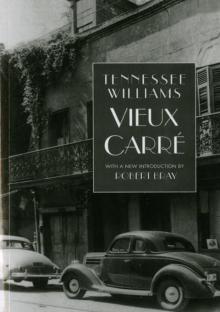 Vieux Carre
Vieux Carre The Night of the Iguana
The Night of the Iguana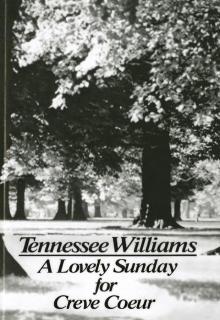 A Lovely Sunday for Creve Coeur
A Lovely Sunday for Creve Coeur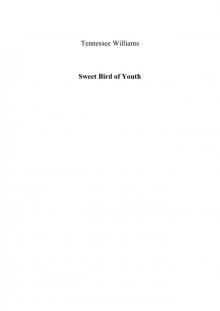 Sweet Bird of Youth
Sweet Bird of Youth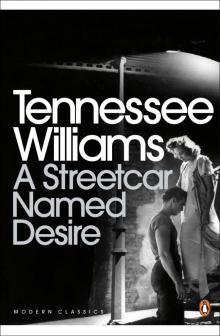 Streetcar Named Desire
Streetcar Named Desire The Milk Train Doesn't Stop Here Anymore
The Milk Train Doesn't Stop Here Anymore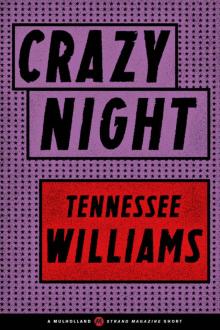 Crazy Night
Crazy Night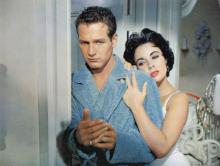 Three Plays of Tennessee Williams
Three Plays of Tennessee Williams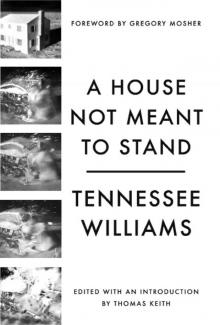 A House Not Meant to Stand
A House Not Meant to Stand 27 Wagons Full of Cotton and Other Plays
27 Wagons Full of Cotton and Other Plays Tales of Desire
Tales of Desire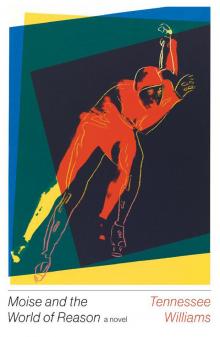 Moise and the World of Reason
Moise and the World of Reason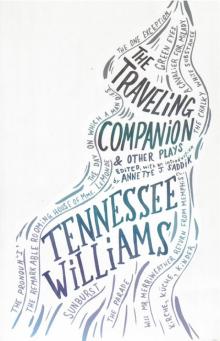 The Traveling Companion & Other Plays
The Traveling Companion & Other Plays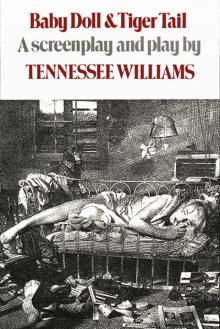 Baby Doll Tiger Tail: A Screenplay and Play by Tennessee Williams
Baby Doll Tiger Tail: A Screenplay and Play by Tennessee Williams Memoirs
Memoirs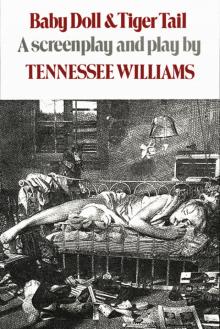 Baby Doll & Tiger Tail
Baby Doll & Tiger Tail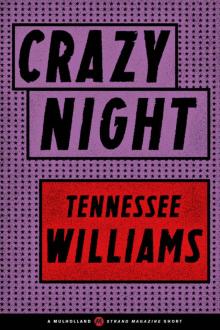 Crazy Night (A Mulholland / Strand Magazine Short)
Crazy Night (A Mulholland / Strand Magazine Short)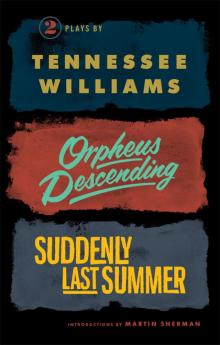 Orpheus Descending and Suddenly Last Summer
Orpheus Descending and Suddenly Last Summer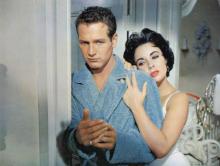 Three Plays
Three Plays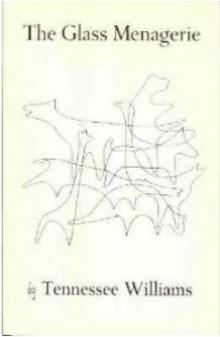 The Glass Menagerie
The Glass Menagerie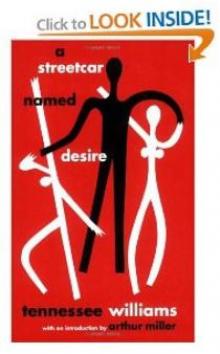 A Streetcar Named Desire
A Streetcar Named Desire